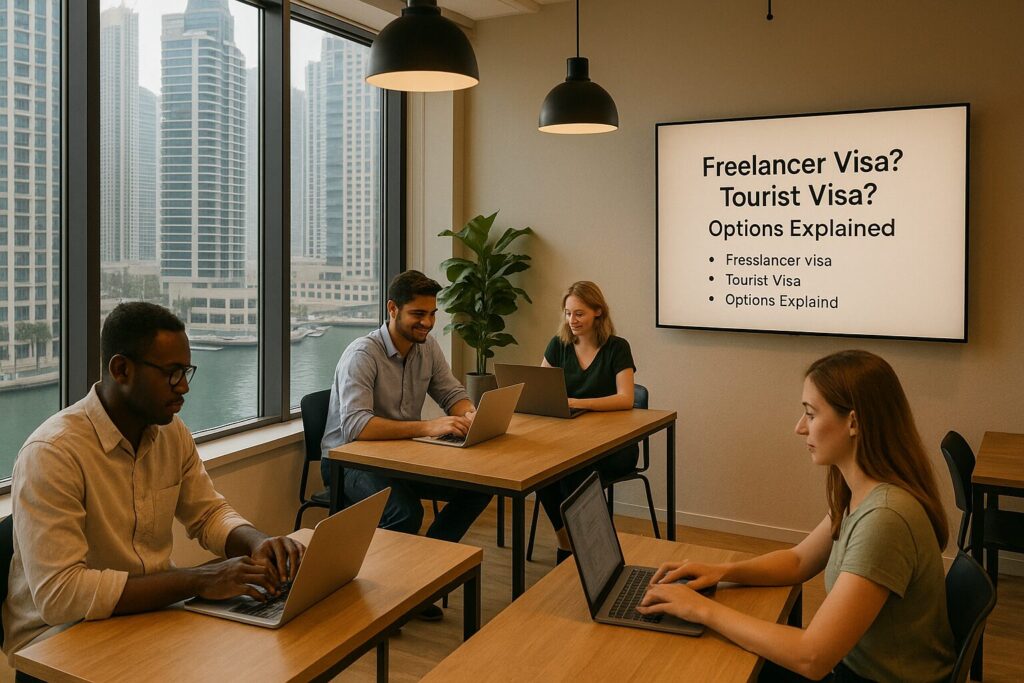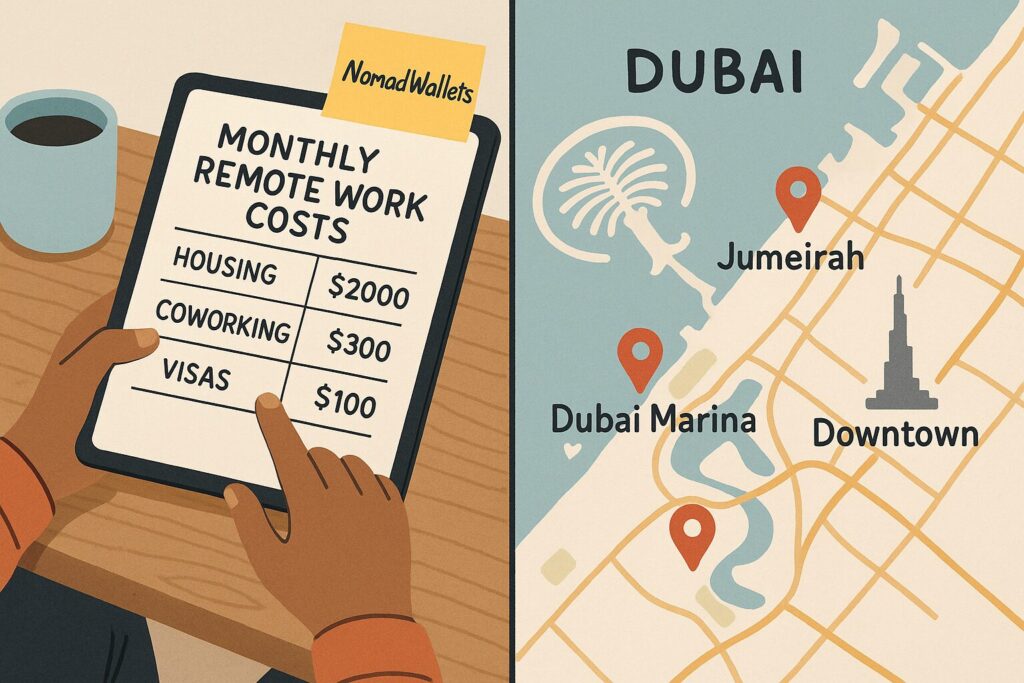
Introduction : How to Legally Work Remotely in Dubai on a Tourist Visa 2025
If you’ve ever searched for “How to legally work remotely in Dubai on a tourist visa 2025,” you’re not alone. Dubai’s dazzling skyline, efficient infrastructure, and tax‑free lifestyle make it irresistible. But can you truly work remotely while holding only a tourist visa? This guide unpacks everything you need to know—legal paths, pitfalls, visa conversions, and realistic budgets—all in 2025’s regulatory landscape.
In the past, many travelers worked informally while on tourist status. But in 2025, UAE authorities have tightened rules. So if you want to stay compliant, it’s critical to understand what’s allowed—starting with the Virtual Work Visa (also called the Nomad Visa). While you can enter Dubai on a tourist visa, remote work without converting to the proper permit may fall into a grey area.
By the end of this guide, you’ll know exactly how to legally Work Remotely in Dubai on a Tourist Visa 2025, whether you’re a digital employee or a solo freelancer, and what steps to follow to convert your status.

1. Tourist Visa vs. Digital Nomad Visa
Tourist visas (aka visit visas) are meant for short stays—14, 30, or 60 days—usually without work permission. During that time, you could technically answer emails or manage clients abroad, but paid remote work is not officially allowed.
Reddit users repeatedly warn:
“Working on a tourist visa is illegal here. It’s a huge red flag for a company.”
That doesn’t mean you’ll be arrested, but if you’re caught or your employer is flagged, things could get messy. Worse, you might lose credibility with clients or face visa denial next time.
✅ So, how to pivot from tourist to legal remote work?
You have two clean, legal pathways:
Option A: Virtual Work / Nomad Visa
- Official Dubai “Virtual Work Visa” allows remote work for foreign employers or clients, but not for UAE‑based clients.
- Must earn minimum $3,500–$5,000/month depending on source.
- You need valid health insurance covering UAE, plus proof of income and contract or bank statements.
- Costs about $611 (AED 2,243) including processing, medical tests, Emirates ID, etc.
- Valid for 12 months, renewable annually. Dependents like spouse or children can be included.
Option B: Freelance Visa via Free Zone
- Register in a UAE Free Zone (e.g. Media City), get a Captain or freelance permit.
- No fixed income threshold but requires evidence of expertise and work credentials.
- Enables working with both UAE-based and international clients.
- Costs range from $2,000 to $5,500 depending on free zone and services.
2. Converting Tourist Visa to Legal Work Permit
Most remote workers arrive on a tourist visa and then apply for the Virtual Work Visa from inside the UAE.
Step-by-step process:
- Fly into Dubai on a tourist/visit visa (30 or 60 days depending on nationality).
- Register the Virtual Work Visa online via GDRFAD or official UAE portals like ICP.
- Submit documents: remote employment contract or client invoices, bank statements, minimum income proof, passport, photos and travel insurance covering UAE.
- Wait 5–14 business days. GDRFAD will issue an entry permit for virtual working—then go to AMER centre for status change, medical fitness test, biometric, Emirates ID application.
- Complete health assessment (blood test and chest X-ray). Most results are ready within 24 hours.
- Receive Emirates ID in 1–2 weeks—after that, your visa becomes legal residence with work authorization for remote work .nomadvisa.me
A Redditor confirmed this path:
“Inside the UAE you can visit an AMER centre… medical, fingerprints… virtual visa would be the most cost effective option.”
❌ Why you should avoid working on a tourist visa:
- Tourist visa holders lack Emirates ID or full residency.
- Cannot legally sign local contracts, rent long-term, or open bank accounts.
- As noted by reddit and news: employers telling you to arrive on tourist visa and converting you is a red flag.
✅ Summary:
If you plan to work remotely and stay longer than 60 days, switching from tourist to virtual work visa is the only legal way to ensure compliance and stability.

3. Eligibility & Requirements
▶ Virtual Work / Nomad Visa (Remote Employee or Freelancer)
- Income requirement: $3,500–5,000/month (some sources require $5K, others $3.5K).
- Documentation:
- Passport (min. 6 months validity)
- Employment contract (1 year min) or freelance agreement
- Bank statements covering last 3 months
- Employer income certificate or freelancer invoices
- Travel medical insurance covering UAE; later converted to local health insurance after ID.
- Minimum age: 18 (no nationality restrictions).
- Health: Clean criminal record and medical fitness test.
▶ Freelancer Visa (Free Zone)
- No hard salary threshold, but must prove professional qualifications or experience.
- Register with a free-zone (e.g. Dubai Media City), get visa tied to your freelance licence.
- Costs vary; may include workspace package or business license fees ($2,000–5,500).
▶ Applying While in Dubai on Tourist Visa
If you already arrived on tourist visa:
- Submit application for entry permit or Virtual Work Visa online.
- Go to AMER centre for in‑person processing (medical, Emirates ID, biometrics).
- Once status changes, you’re legally allowed to live and work remotely.
4. Costs & Timeline
💸 Virtual Work / Nomad Visa Costs
- Entry permit / visa application fee: AED 1,022.50 (~USD 278)
- Status change fee: AED 672.50 (~USD 183)
- Medical test (blood + X‑ray): AED 354 (~USD 96)
- Emirates ID fee: AED 341.70 (~USD 93)
- Biometrics fee: AED 254.55 (~USD 69)
- Total: ≈ AED 2,243 (~USD 611)
Processing time: Typically 2–3 weeks from entry to receipt of Emirates ID and final visa status.
🧾 Freelancer Visa Costs
- Varies widely by free-zone and chosen package.
- $2,000 to $5,500 common range depending on workspace or included services.
📅 Tourist Visa Extensions
- You may extend tourist visa once (usually by 30 days) via GDRFA app.
- But continued remote work without switching to proper permit is not compliant.
5. Taxes, Legal Considerations & Lifestyle
🏦 Taxes
Dubai doesn’t tax foreign‑earned income—not personal or corporate—so your salary from abroad is untaxed locally.
Still, you must file tax returns in your home country if you’re resident for tax purposes there.
To count as UAE tax resident, you must spend at least 183 days/year in UAE and obtain a Tax Residency Certificate if needed.
💻 Legal Work Boundaries
- Virtual Work / Nomad Visa holders cannot work for UAE-based clients, only for clients or companies outside the UAE.
- Freelance Visa holders can serve both UAE and international clients.

🌆 Lifestyle & Living Costs
Dubai is more expensive than other nomad hubs. According to sources, digital nomads spend $2,500–3,500/month for a comfortable lifestyle including rent, coworking, and leisure.
Expect:
- 1BR apartment: AED 5,500–12,500/month (~USD 1,500–3,400) depending on location.
- Internet + utilities: AED 550–900 (~USD 150–240).
- Food & groceries: AED 1,470–2,200/month (~USD 400–600).
- Transport, coworking, entertainment: AED 730–1,460/month (~USD 200–400).
🛡️ Safety & Services
UAE ranks among the top 5 safest countries globally—excellent healthcare, low crime, high digital reliability.

6. Step-by-Step: Working Legally on Tourist Visa 2025
- Fly into Dubai on tourist visa (30 or 60 days).
- Use Wi-Fi or coworking spaces to begin light remote work—but do not sign local contracts or take UAE clients.
- Within your visa duration, apply online for the Virtual Work / Nomad Visa. GDRFAD or ICP portals accept tourist-held applications.
- Visit AMER centre for status change, medical, Emirates ID, biometrics.
- Once residence visa is stamped, switch your insurance to local health plan and potentially open a UAE bank account.
- From that point—you’re working legally under UAE law for international clients or employers.
7. Why Dubai Is Attractive for Remote Workers in 2025
- Zero personal income tax on foreign earnings.
- Top-tier infrastructure, ultra-fast internet, global connectivity.
- Family‑friendly residency—you can sponsor spouse and children on virtual work visa.
- Safe, modern urban environment: clean, secure, with a mix of expat and local culture which makes settling in easier.
- Multiple visa options—virtual work visa, freelancer permit, Green Visa, golden visa—allow flexibility for longer-term planning.
It’s no wonder the UAE ranks among the best digital nomad destinations in 2025.
Conclusion
So, to answer the core search query: How to legally work remotely in Dubai on a tourist visa 2025? – the simple truth is: you can arrive on a tourist visa but you must switch to a legal remote‑work permit (virtually the Digital Nomad Visa or freelance setup) within that window.
Once your Virtual Work Visa is granted, you’re legally allowed to work for non‑UAE employers, live in Dubai rent‑free of local employment regulations, and enjoy all resident benefits—Emirates ID, health insurance, local services—all while earning tax‑free income from abroad.
You’ll pay around USD 611 for visa processing, plus living costs that range $2,500–3,500/month, depending on your standard of living. Or choose the more flexible freelance visa if you want to engage with local UAE clients.
This path keeps you compliant, gives you access to long‑term residency, and unlocks a world‑class lifestyle in one of the fastest‑growing digital nomad destinations today.
(FAQs)
Q1. Can I legally work remotely in Dubai on a tourist visa in 2025?
No, you cannot officially work remotely on a tourist visa in Dubai in 2025. However, many digital nomads do so discreetly for short periods. A better option is the UAE Remote Work Visa.
Q2. How long can I stay in Dubai on a tourist visa while working remotely?
Most tourist visas allow you to stay up to 60 days, extendable once for another 30 days. For longer remote work, consider applying for the UAE Remote Work Visa.
Q3. What are the risks of working remotely on a tourist visa in Dubai?
Working remotely on a tourist visa in Dubai is legally risky. If caught, you could face fines, deportation, or a ban. It’s safer to apply for a proper visa.
Q4. What is the UAE Remote Work Visa and how do I apply for it in 2025?
The UAE Remote Work Visa lets foreign nationals live in Dubai while working for overseas companies. Apply online with proof of income and remote employment.
Q5. How much does it cost to live and work remotely in Dubai in 2025?
Monthly costs range between $2,500–$4,000 depending on your lifestyle. Key expenses include rent, coworking, insurance, visa fees, and basic living costs.